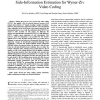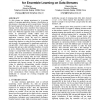9 search results - page 1 / 2 » Learning from the past for resolving dilemmas of asynchrony |
SIGOPS
2010
13 years 3 months ago
2010
This paper presents two design approaches to avoid many complications introduced at both user and developer levels by the FLP impossibility. The first approach is appropriate in m...
TCSV
2010
12 years 11 months ago
2010
During the past ten years, Wyner-Ziv video coding (WZVC) has gained a lot of research interests because of its unique characteristics of "simple encoding, complex decoding&quo...
IJCAI
2001
13 years 6 months ago
2001
R-max is a very simple model-based reinforcement learning algorithm which can attain near-optimal average reward in polynomial time. In R-max, the agent always maintains a complet...
SIGMOD
2006
ACM
14 years 5 months ago
2006
ACM
As data streams are gaining prominence in a growing number of emerging application domains, classification on data streams is becoming an active research area. Currently, the typi...
AIED
2007
Springer
13 years 11 months ago
2007
Springer
In many intelligent tutoring systems, a detailed model of the task domain is constructed and used to provide students with assistance and direction. Reciprocal tutoring systems, h...


